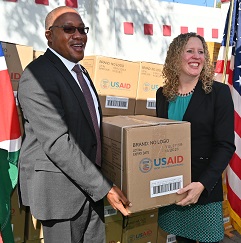
Dundee commits to continued support for health
Dundee Precious Metals Tsumeb said earlier this week it welcomes the release of the recent government medical report which independently assessed the health of more than 1700 past and present smelter workers.
Consistent with their core values of health and safety, environmental responsibility, transparency, and continuous improvement, Dundee Precious Metals Tsumeb has worked cooperatively with the Namibian government and the health assessment team since the survey was announced in 2011. “We are committed to implementing the report recommendations to further minimise health impacts on our workers and the community,” Dundee Precious Metals said.
“Dundee is confident that the many changes we started implementing and the investments we committed to upon acquiring the Tsumeb Smelter in 2010 to bring environmental protection and worker health and safety to world-class standards were appropriate, and that the projects that are completed are having a positive impact on our people and their working conditions,” they added.
The company summarised and clarified the key findings of the report including how Dundee Precious Metals Tsumeb will be responding to them.
Dundee noted that there were no cases of cancer attributable to arsenic exposure or any other employment-related exposure at the smelter, contrary to some media reports which misquoted the report.
Besides skin rashes being potentially linked in some cases to individual arsenic exposure sensitivity, the survey found no other potential arsenic-related occupational health problems such as lung, liver, blood, or other occupational diseases.
“There are incidences of occupationally induced skin rashes. Dundee has medical and operational protocols in place to deal with skin rashes whether caused by arsenic exposure or the use of personal protective equipment in hot and humid conditions,” Dundee said.
Added the mining company, “There are a number of long-term employees or ex-employees with hearing loss which may be occupational. In cases where this hearing loss is confirmed by independent tests to be linked to the smelter, employees will be assessed for compensation under Dundee’s government- and union-mandated policies.” Health problems unrelated to occupational exposure were reported among the surveyed employees. Dundee Precious Metals Tsumeb already has a leading best-practice wellness programme in the early stages of implementation which is free to employees. Consistent with the report’s recommendations, Dundee will be working with its employees to extend the reach and effectiveness of this programme wherever possible. The health survey, funded by Dundee Precious Metals Tsumeb, was the largest of its kind in southern Africa. Dundee believes that the health impact of the smelter is low and is declining continually and significantly. The health survey has established an important baseline to assist monitoring the trend. Since acquiring the smelter four years ago, Dundee has improved environmental monitoring and reporting, enforced the use of personal protective equipment and invested over N$3 billion in modern arsenic-handling facilities and in a sulphuric acid (SO2) manufacturing plant to reduce SO2 emissions.
Dundee Precious Metals Tsumeb thanked the team of investigators and independent experts who conducted the survey. “We remain committed to working with the Namibian Government, our employees and the community, and the organizations and independent experts involved to continually assess and improve conditions at the smelter and in the community,” said Dundee.













































